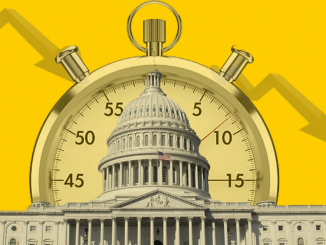We should all “March For Science” this Earth Day. But let’s get one thing straight. The assault on science is nothing new. It’s been going on under Democrats and Republicans alike for decades. Trump’s attacks are particularly blatant and vociferous, but the situation was thoroughly unacceptable long before he moved into the White House.
The solution isn’t changing administrations. It’s changing the system.
Here’s what’s we’ve been dealing with for decades with respect to science and science-based public policy:
Big corporations block the collection and sharing of basic scientific data.
It’s hard to establish connections between pollution and its impacts, if pollution is hidden and obscured. That’s why pesticide corporations fight tooth and nail against things like pesticide use reporting and air monitoring. That’s why the oil and gas industry works so diligently to keep the identity of fracking chemicals secret. Science has been significantly undercut by the absence of basic data collection for a long time.
Big corporations fund countless research studies each year, inundating our world with biased findings that exonerate their products.
The “funding effect” is widely acknowledged and has been documented in multiple analyses. The party who pays the piper does indeed call the tune. How a study is framed, designed, conducted, and interpreted has everything to do what it finds. And in a pinch, if results might threaten profits, corporations can deep-six studies instead of publishing them.
Take chlorpyrifos, for example—a neurotoxic pesticide produced by Dow Chemical to which farm worker families, including children, are regularly exposed. When I worked with those families in their struggle for environmental justice, Dow spokespeople claimed that “over 3600 studies and reports” established their product’s safety. Scanning the literature it was clear that a substantial portion of those studies and reports were funded by Dow and other pesticide manufacturers.
A 2009 analysis of 19 Dow-authored chlorpyrifos studies conducted by a team of neuroscientists at Stanford was telling. It concluded that there was an “extraordinarily high” rate of scientific errors in the studies. None of the errors increased the likelihood of concluding that chlorpyrifos is dangerous. Indeed the vast majority served to minimize chlorpyrifos’ dangers.
Big corporations pull the strings at EPA.
Justifiable outrage is being expressed over the Trump Administration’s dramatic dismantling of the EPA and its programs. But the truth is that EPA has not been a champion for public health and our environment for a very long time.
In 2006, six unions representing thousands of EPA employees sent a letter to the head of the agency, expressing deep concern over its failure to protect public health. The letter noted that colleagues in EPA’s Pesticide Program felt “besieged by political pressure exerted by Agency officials perceived to be too closely aligned with the pesticide industry and former EPA officials now representing the pesticide and agricultural community; and by the USDA through their Office of Pest Management Policy.” The letter expressed equal alarm about “the belief among managers in the Pesticide and Toxics Programs that regulatory decisions should only be made after reaching full consensus with the regulated pesticide and chemicals industry.”
The undue influence of the chemical industry on EPA continued under Barack Obama. His Administration issued reauthorization after reauthorization for all sorts of nasty pesticides, and gave the green light for a slew of new ones as well. The makers of genetically modified organisms had a field day over the last eight years. So did the manufacturers of pesticides harmful to pollinators and of all sorts of other toxic chemicals. Relying primarily on biased industry data and ignoring huge warning signs in the independent research, EPA served corporate interests, not the public interest.
Of course there have been some incremental improvements in the regulation of environmental destruction under Democratic administrations, but these have been extremely limited in scope. They have been dwarfed by much more important corporate-serving decisions. Despite token measures related to climate change, for example, the Obama Administration’s primary legacy was to massively increase U.S. fossil fuel production and infrastructure. Obama bragged about record-high oil and gas extraction rates, tens of thousands of miles of new pipelines, greatly expanding offshore drilling, and more. Overall, we lost significant ground in the fight against global warming as the result of his policies.
Even Trump’s outrageous requirement that the term “climate change” be erased from government websites is not without precedent. In 2009, Obama’s green team invited environmental groups to the White House to talk about climate change. The groups were asked to not use the term “climate change” because it was not a winning message. The Obama Administration was committed to not talking about climate change and the threat it poses, and environmental groups were asked to follow suit. Many apparently did. The resulting years of silence about global warming were deadly. Climate deniers, of course, continued to blast their misinformation, causing public confusion exactly when we needed clarity. Only Superstorm Sandy forced the Administration and subservient environmental groups to start talking about climate again.
Big corporations use the White House to circumvent agency decisions and the science they’re based on.
For a long time, corporations have had a back-up strategy to handle instances where, despite constant pressure, government agencies promulgate rules that might interfere with profits. They rely on the White House to adjust or derail those rules. This practice did not abate under Obama. The White House Office of Information and Regulatory Affairs (OIRA) ensnared thousands of draft regulations from EPA and other agencies for cost-benefit reviews. OIRA did not hesitate to substitute its judgment for that of the agencies. In fact, the rate of OIRA interference with agency rules under Obama was higher than that under George W. Bush. Obama even issued an Executive Order expanding OIRA’s purview to encompass existing rules, not just newly proposed ones.
In one of the few OIRA derailment dramas under Obama that wasn’t hidden from public view, EPA was forced to rescind a new rule protecting people from smog, even though it had already weakened that rule at the request of the White House. OIRA made EPA confirm a weaker Bush-era smog rule that the EPA Administrator had described as “not legally defensible given the scientific evidence.”
Big corporations undercut independent research
The scientific research landscape is dominated by corporate funding, as noted above. But corporations also interfere with research they don’t fund.
Scientists who want to study the environmental impacts of genetically modified (GM) seeds, for example, find that seed licensing agreements specifically bar research without approval from the patent-owning corporation. Twenty-six university scientists from 16 states anonymously submitted a letter to EPA decrying this situation. “As a result of restricted access, no truly independent research can be legally conducted on many critical questions, regarding the technology [GM agriculture], its performance, its management implications, IRM [insecticide resistance management], and its interactions with insect biology. Consequently, data flowing to an EPA Scientific Advisory Panel from the public sector is unduly limited.” The scientists did not share their names because they feared reprisals, such as not being able obtain or retain private-sector research funding.
This letter to EPA spotlights just one of the ways big corporations undermine independent scientists. They deny them materials, information, access to workplaces and other critical items. Moreover, since independent research is often government-funded, corporations can use their vast lobbying resources to attack funding for scientists who engage in research they don’t like.
Corporations can also launch smear campaigns and make life miserable for scientists who displease them. Professor Tyrone Hayes was the subject of such a campaign. Chemical giant Syngenta didn’t like his research linking their pesticide atrazine to reproductive abnormalities in frogs. So the company held regular meetings specifically focusing on how to discredit Hayes. Syngenta’s anti-Hayes team members committed themselves to identifying and exploiting his psychological weaknesses. They lined up cadres of seemingly independent scientists to attack him. They generated lists of ideas that included things like “ask journals to detract” his studies, “set a trap to entice him to sue,” “investigate funding”, and “investigate wife”.
We know all this from Syngenta’s own documents, obtained by municipalities who sued the corporation for atrazine contamination of their water supplies. Before those documents became public, many people assumed Hayes was imagining things.
Hayes isn’t the only scientist who’s been maligned by corporations for threatening their bottom line. If you dare to publish findings that might affect corporate profits, beware.
Big corporations spend big bucks on PR strategies that profoundly affect the information that flows through our society.
The smear campaign against Hayes is just one example of a wide array of public relations strategies implemented by private corporations. There really is no limit to what they can do with the giant piles of money at their disposal.
Corporations create front groups and foster relationships with “experts” who pretend to speak in the public interest, but are really on corporate payrolls. Doctors who seem to care deeply about burn victims testify against controls on toxic flame retardants, spreading false information, and not mentioning that they are funded by the chemical manufacturers. “Independent” scientists and organizations insist that pesticides are needed to feed the hungry world, without letting on that they are funded by the pesticide industry. Misinformation flows endlessly through our society. So much so that it’s impossible to counter all of the lies.
Corporations pour money into higher education, influencing students and the work they do now and in the future. Dow Chemical funds hundreds of “sustainability” fellows at my alma mater, the University of Michigan, for example. Dow’s thoroughly unsustainable products—like chlorpyrifos, dioxin, and napalm —are simply ignored. So is the strong criticism from Stanford scientists mentioned above regarding the quality of Dow’s scientific research. The $10 million “sustainability” gift from Dow is not their only multi-million dollar gift to the U of M. And this is just a tiny piece of the overall enormous funding of higher education by environmentally destructive corporations.
Dow, Exxon, Syngenta and other polluting corporations also pour money into K through 12 education. Science teachers and schools are targeted with grants, curricula, trainings, and more.
Meanwhile, the news media is privately owned, and the coverage of science and other issues dramatically reflects that fact. As the number of reporters has steadily declined, the number of people employed by PR firms has risen. PR materials produced for corporations seeking to maximize profits can now be presented as the news without any vetting or investigation whatsoever.
Science and Policy-making Before Trump: A Recap
In short, we have been totally screwed on science and science-related public policies for a long time. Yes, Trump is dismantling EPA and other agencies. But they were already rotten to the core. Yes, there’s now a blatant disrespect for science and for basing public policies on actual facts. But corruption and manipulation of science has been rampant for generations.
All of this leads to society’s utter failure to adopt the life-saving policies we urgently need. Our world is inundated with misinformation—corporate-serving lies dressed up as “sound science.” As icing on the cake, corporations’ PR strategies often turn reality on its head, accusing sound science-based activists of being unscientific or promoting “junk” science.
Our being screwed on science and science-related policy is part of a bigger reality: we’re getting screwed on most issues. Professors at Princeton and others have documented what everyone already knows: working people (i.e. the vast majority of people) are unable to put in place the policies we want. The 1%—the owners and CEOs at the top of major corporations—do win the policies they want. In other words, we don’t live in a democracy.
And with each passing year, things get worse. The gap between rich and poor grows. The few who have our species in a stranglehold have more and more money to spend. And they are tightening their grip. Meanwhile we’re running out of time on multiple ecological fronts.
Why Is It Like This?
The answer is clear: capitalism. The manipulation and abuse of science flows inexorably from this irrational and undemocratic economic system. So does our broader disempowerment and our rapid descent towards extinction.
The fossil fuel industry, agribusiness and other major industries that determine the fate of humanity are privately owned. They are operated for private profit. So a few people hold the reins for society. They make the big decisions that determine our destiny.
They also have at their disposal huge piles of money that they use to distort every aspect of public discourse and policy-making, including what happens to science. The profits produced by working people’s labor don’t flow to us and to our public coffers to be used for the things we want. Those profits flow upward to the few at the top of the big corporations. Capitalists are supposed to accumulate wealth under capitalism, and boy, do they ever.
The whole set-up is inconsistent with democracy. And without democracy, we’re not going to survive, pure and simple.
What Would Albert Einstein Do?
There is another way to organize things. Albert Einstein talked about it.
Fundraising materials for the March on Science feature Einstein’s quote: “Whoever is careless with the truth in small matters cannot be trusted with important matters.” But they really should have included another quote of his as well. After laying out how capitalism works and the “grave evils” that result from it, Einstein declared that “there is only one way to eliminate these grave evils, namely through the establishment of a socialist economy, accompanied by an educational system which would be oriented toward social goals.”
We need public ownership of the major industries coupled with vibrant grass-roots-up democratic management of those industries. Together we can plan, and we can directly put in place the ample solutions that are sitting right there in front of us. Together we can institute and enforce an Economic Bill of Rights that guarantees everyone a good-paying job, free health care and free education. Instead of living stress-filled lives exploited and extorted by a few at the top who hold the reins and the money, we can participate fully in our self-governance making the humane and species-saving decisions that need to be made.
As we denounce Donald Trump’s belligerent, anti-science, bigoted, 1%-serving policies, we need to also denounce the situation that prevailed before Trump. It’s time to tell the truth and aim high. Getting beyond Trump will not be enough. We need to get beyond capitalism. Now.
All of our strategies and tactics must illuminate the way forward. They must build a powerful working class movement for economic democracy. That means leaving dead-ends like the Democratic and Republican parties behind. We need to change the system, not just the particular personality and particular capitalist party that is in the White House.
The time is right. Huge shifts are underway. If we don’t allow the deepening desire for real change to be diverted by false friends, we can honor science, create democracy and save our species.
So, yes, march for science on Earth Day. But remember: to defend science and build a just, rational world, capitalism must go.




